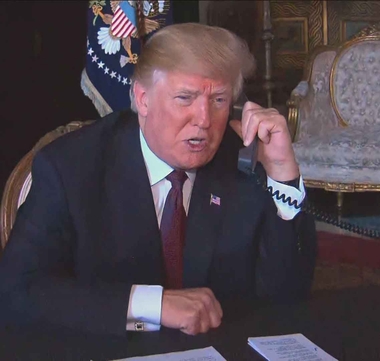Trump's gut vs. the government on science, economy, intelligence

This week, on three different fronts, we learned how smart President Donald Trump thinks he is (very) and where he gets those smarts from (his gut).
Speaking to reporters from The Washington Post Tuesday, Trump explained his frustration with the Fed, its chairman and the board of governors, which operate mostly outside the political infrastructure to control the nation's central banking system.
During an in-depth discussion about the economy, Trump was in the middle of complaining that by raising interest rates, the Fed is not working to help him in the same way that central banks in Europe and China do.
That's when he told us about his gut.
"So I'm doing deals, and I'm not being accommodated by the Fed," Trump said. "I'm not happy with the Fed. They're making a mistake because I have a gut, and my gut tells me more sometimes than anybody else's brain can ever tell me."
He went on to complain about the Fed chairman he nominated, Jerome Powell, and grouse that the Fed, albeit under different chairmen, gave President Barack Obama lower interest rates. Never mind that most of Obama's presidency was in the midst of or recovering from The Great Recession, whereas Trump has enjoyed a presidency entirely of record-low unemployment and stock market records. The Fed began slowly raising, or "normalizing," rates on its funds in December of 2015.
But this whole thing is not about monetary policy or whether the Fed should be "normalizing" rates. The specific reason Trump said he's frustrated with the Fed and its board of governors is that his gut is telling him things their brains don't understand.
That's not too different from his skepticism of the massive climate change report written with input from 300 scientists and 13 government agencies that predicts increased catastrophic weather, economic peril and deaths because of climate change.
His administration buried the report, with was required by law, releasing it on Black Friday.
"I don't believe it," Trump told reporters Monday of the report.
In the Post interview, he again cited his own intelligence in explaining why he's skeptical of climate change.
"One of the problems that a lot of people like myself -- we have very high levels of intelligence, but we're not necessarily such believers. You look at our air and our water, and it's right now at a record clean," he said, conflating pollution with climate change, and arguing China and Russia are much dirtier and should do more.
Later in the interview, he said he won't believe in climate change unless he can see it.
"As to whether or not it's man-made and whether or not the effects that you're talking about are there, I don't see it -- not nearly like it is," he said. But he argued the growth of devastating wildfires is not such evidence and he expanded on his theory that excessive brush and lax forest management are more to blame.
Neither his disdain for the Fed nor his disbelief of 300 scientists is too much different from the way he treats the US intelligence community, which he doesn't believe on many counts, like its unanimous declaration that Russia interfered in the 2016 election.
More recently, however, the administration has made it difficult for CIA Director Gina Haspel to even meet with senators to share the CIA view that the Saudi Arabian government and Prince Mohammed bin Salman was responsible for the death and dismemberment of the American-based Saudi dissident journalist Jamal Khashoggi in Turkey earlier this year.
Despite the CIA determination, Trump has publicly said they aren't done gathering facts.
"Our intelligence agencies continue to assess all information, but it could very well be that the Crown Prince had knowledge of this tragic event -- maybe he did and maybe he didn't!" Trump said in a presidential statement. He essentially said it wouldn't matter either way because, according to Trump in that statement, Saudi commitments to buy US arms are more important.
Trump's skepticism of the government he leads is nothing new, but it seems to be growing during his time in Washington, during which he's remade the GOP around him, rejecting moderating influences.
Old Washington hands like Reince Priebus and Sean Spicer did not last long in Trump's White House. He's replaced moderates pushed into his orbit by the Republican establishment -- like former Secretary of State Rex Tillerson or former National Security Adviser H.R. McMaster -- with people who see the world his way.
His main gripe with Homeland Security Secretary Kirstjen Nielsen is that she isn't tough enough despite overseeing a more militarized border and the no-tolerance policy toward illegal border crossings. He had long been frustrated by Attorney General Jeff Sessions, so he fired him after Election Day and elevated as a placeholder an unvetted skeptic of the Russia investigation.
Trump now says he didn't know Acting Attorney General Matt Whitaker before making him the top law enforcement official in the country, despite previously making positive public comments about Whitaker. But when the administration placed Whitaker in the role instead of Deputy Attorney General Rod Rosenstein, who was next in line, it felt like a gut decision too.
Analysis by Z. Byron Wolf, CNN. The-CNN-Wire™ & © 2018 Cable News Network, Inc., a Time Warner Company. All rights reserved.
The Gayly – November 28, 2018 @ 10:45 a.m. CST.





